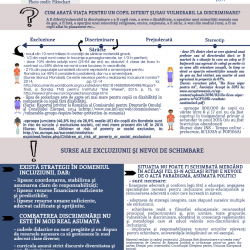How does the act of discrimination made by others affect me, even if I do not discriminate against anyone
After reading and analyzing press articles, scientific papers, interviews, some various points of view and interventions concerning rights or how are they taken from us, I have found (with a few exceptions) their “objective” character: we offer solid arguments (economic, social, moral, political, cultural, even philosophical), which prove, unquestionably, that discrimination, of any kind, is harmful and, consequently, that inclusion is good. Also, taking into account the power of the presented arguments, we consider that everybody should agree to abandon every type of discrimination, starting the next second. After this, everyone minds their own business convinced that we are living in a better world.
After some time passes, we notice that despite having been offered ”enlightment”, people continue to behave the same, “irrationally”, discriminating some individuals or groups. Beyond the fact that we overestimate people’s capacity of making rational decisions (see, for example, Richard Thaler’s studies), people change their behavior only if they consider there is something to gain from that change.
This is why, I believe, it isn’t enough to “objectively” present anti-discrimination arguments: they have to be “reversed” in order to be perceived from the perspective of individual interests and needs: how does the societal discrimination affect me, even if I do not discriminate against anyone. That is how I started thinking about how my fundamental rights are affected by the fact that, in school, some children (poor ones or coming from less educated families, Roma children or the ones suffering from disabilities etc.) are discriminated.
- Education levels positively relate to employment: according to a study made for UNICEF, every additional year to one’s education increases the chances of employment with 8%. The ones who do not have access to education and professional qualifications will benefit from social insurance and will unemployed for longer periods of time, maybe even for a lifetime. Thus they are going to be resource and public money consumers, and these have to come from somewhere, don’t they? Consequently in order to purchase these resources, the tax level of the economy will always be high. Economic operators will have big expenses that are going to affect their productivity (meaning the chance to sell and survive on the market), along with the possibility to increase wages for their own employees. Nor will there be an increase in the public sector (from where I am), salaries because, on one side, there won’t be any resources for it, but alsothere has to be a balance between the salaries in the private and the public sector. So, the discrimination in the educational field affects my salary (no matter if I work in the public or private sector).
- Those who do not have access to a higher quality education will be thickening the lines of the functional illiterates (over 40% from the population in schools, according to PISA). Consequently they will have poorly paid jobs (if they even have one – see the previous point): every missing year of education means a decrease in income with 8% (according to the same UNICEF study). As a result contributions to the social insurance system will be fewer and, because I will retire in three and a half years, this directly affects me: my pension will be lower because of the discrimination in the education system.
- For the same reason (a significant part ofthe scool population which does not benefit from quality education), the ones who finish school, with more or less struggle, will have lower salaries and they will buy less. As a result, VAT collected amounts collected which fund public expenses for education, health etc will be lower. This is why discrimination in education limits my right to education lifelong (you can see how well Romania handles this field…), the right to health and even the right to life (due tothe lack of funds, there is the possibility that the hospital I’m going to need, for sure,will not be able to offer adequate treatment).
- In addition, high education levels positively relate to the health field (data from OECD, confirmed by the same UNICEF study, show that every additional year of education lowers the chances of sickness with 8%). As a result the ones who do not benefit from access to education will be much more in need of health services, loading the state’s health budget, which is already low,thus affecting more the state’s capacity to ensure my right to life and health.
- The marginalized ones, the excluded, the discriminated tend to create cult-like group cultures (which are similar to religious sects): very powerful, very cohesive, but also hostile to the ones not being part of that culture. As a result, taking into account that the need of belonging is a fundamental need (apud Maslow), the excluded, discriminated and marginalized have bigger chances to adhere to fundamentalist groups – used successfully for terrorist purposes. So discrimination in education affects my right to life, to personal safety, and to free movement.
- Moreover, accordingly to the OECD data, low education levels are negatively linked to criminality: the percentage of individuals with a low education level and with no qualification, from the total amount of incarcerated population, rises up to 90%. Thus discrimination in education (which leads to marginalization and exclusion) affects my right to personal safety and, also, touches my right to life.
- Finally, a higher level of education positively relates to (also from the OECD data) the social participation (including voluntary work and taking part in civic initiatives) and to political participation(the will to vote, being part in a political party etc.)– so to the very essence of democracy. Moreover, totalitarian political regimes, any kind of fundamentalism, and populism rely on the voters’ lack of education. As a result discrimination in education directly influences my right to life in a democratic society.
Therefore discrimination is not just something that only happens to the others and only affects them. Discrimination affects all and each one of us. As a result I believe the fight against discrimination in schools and, generally in society does not have to be considered only moral, for the sake of art and justice, but it should become a very personal fight: discrimination (even the one made by others) make me poorer, sicker, more exposed to delinquancy and, generally, more insecure regarding tomorrow.
by Șerban Iosifescu
Șerban Iosifescu holds aPhD in Education Science, and is the Head of the Romanian Agency of Quality Assurance in the Undergraduate Studies. He has experience as a professor in Undergraduate and Graduate Studies, concerning adults’ education and training of trainers, as well as in educational research. He has published over 50 published papers, on subjects about education. He is an international expert – World Bank and the European Commission.










1 Response